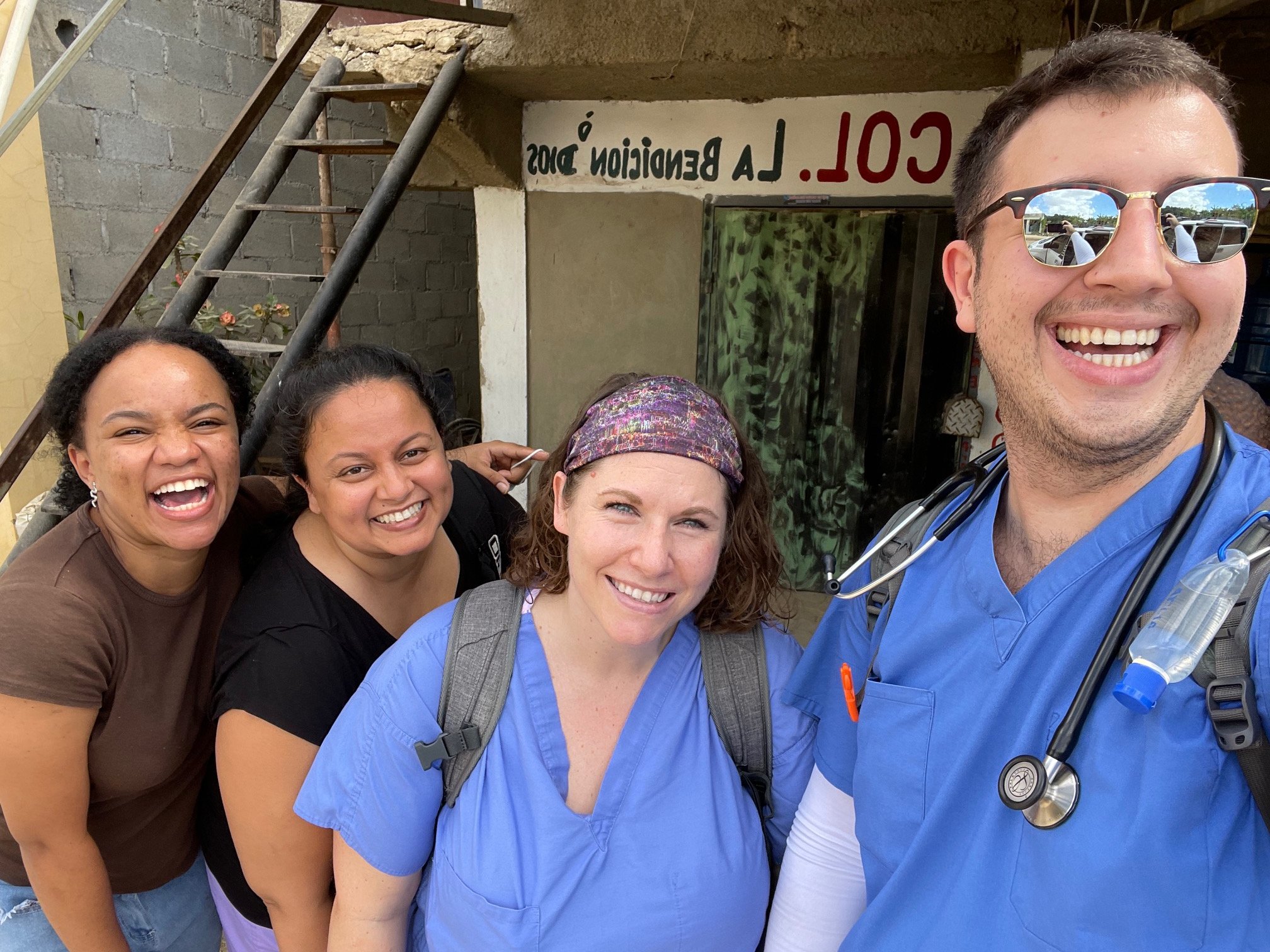Volunteering in Villa Verde
Sandra McIntyre with patients in Villa Verde, Dominican Republic
Meet two medical volunteers who travelled to Villa Verde, Dominican Republic this February: Sandra McIntyre, an experienced Nurse Practitioner who is currently working in the PCIU, and Wiktor Witkowski, a graduate from the University of Illinois with a BS in neuroscience. Learn about their experience in global health:
Why did you choose to go on a global health trip to the Dominican Republic?
SM: I wanted to give back to the community and those in need.
WW: This is my second global health trip with CE/Rush. I was Introduced to these trips by Dr. Waldman. We work together at CommunityHealth Clinic in Chicago. I first got involved with CommunityHealth, since as an Immigrant myself, I know firsthand that so many people face significant health disparities in Chicago. Having an understanding of the health inequities that exist at home, among people of all ages and backgrounds, especially those who face significant barriers to accessing healthcare due to socioeconomic status, immigration status, etc. made me interested in how this issue presents on a more global scale.
What did a regular day look like?
WW: We would start the day off early, after breakfast heading out on about a 45 minute drive to the community of Villa Verde. I was mostly responsible for pharmacy operations alongside Pam Dryier, RN. We would set up our pharmacy inside the newly established clinic, which the community members in Villa Verde helped build, setting up a system for dispensing medications, providing nebulizer treatments, BP checks, wound care etc. Patient instructions on medications and refills.
What were some highlights and/or accomplishments that you are proud of?
SM: I am proud that we were able to treat almost 400 patients and I wish I could have helped even more.
WW: Seeing the same faces that I did last time I was there. Working with the same staff and community members, seeing the same patients, the continuity of care. Working with Dr. Waldman and Dr. Waickus was especially meaningful as they have been on so many of these trips and the patients there are familiar with them. The continuity of care aspect was special, allowing patients to have a more established trust in the provider.
Sandra, Wiktor and team in Villa Verde.
What were some of the difficulties?
SM: The lack of potable/ running water and paved roads were challenges. These were areas I had been mentally preparing myself for but much harder to navigate in real time.
WW: Lack of supplies, lack of power, running out of medication, having to bring patients back next day so that medication could be brought back with us, language barriers. Lack of an Electronic Medical Records, which is being developed but not ready yet. We had to nebulize several patients, but we often did not have access to power in clinic. A difficulty that I experienced emotionally was seeing so many people who are food insecure, who often lack access to potable water (thankfully this will change soon with the water purification system in the community), people who often lack access to power - commodities we’ve grown used to in the US.
What did you learn about working in another country's healthcare system?
WW: I learned that the inequities we see in the US translate to other countries as well. The Dominican healthcare system is just as stratified as our own. While people do have access to a national healthcare plan/system where they can get testing and medications and other procedures/visits for free or for a lowered cost, often times they are left waiting or having to travel extremely long distances to obtain much needed care. There are also complexities and procedural aspects to this, with various eligibility requirements, documents that people often times might not meet/have. Many medications are also not paid for by the national formulary and people still have to pay out of pocket.
What I found interesting was that patients will often will have complex diagnostic procedures completed, but they still lack the basic answers and understanding as to why that testing was ordered or what conditions they have. People lack access to medication that we would consider standard practice in the US to treat something, but they did have an MRI scan done, just because of a headache that they described. That is interesting to me how various things are common to come by and are seemingly prioritized by providers without being followed up on later, without proper treatment plans being initiated after diagnostic testing. The difference in protocol and how conditions are diagnosed and treated.
What was the experience like working with medical students/healthcare personnel from the DR?
SM: They were wonderful and helped me acclimate into the community.
How did this trip impact your view of global health?
SM: It will help me appreciate the amount of medical supplies and resources that are readily available and allow me to be more cognizant of unnecessary waste.
WW: It continued to expand my interest in global health. As an aspiring physician, I aim to attend more of these trips to help ensure that communities abroad also get the quality access to healthcare that they desperately need and deserve.






